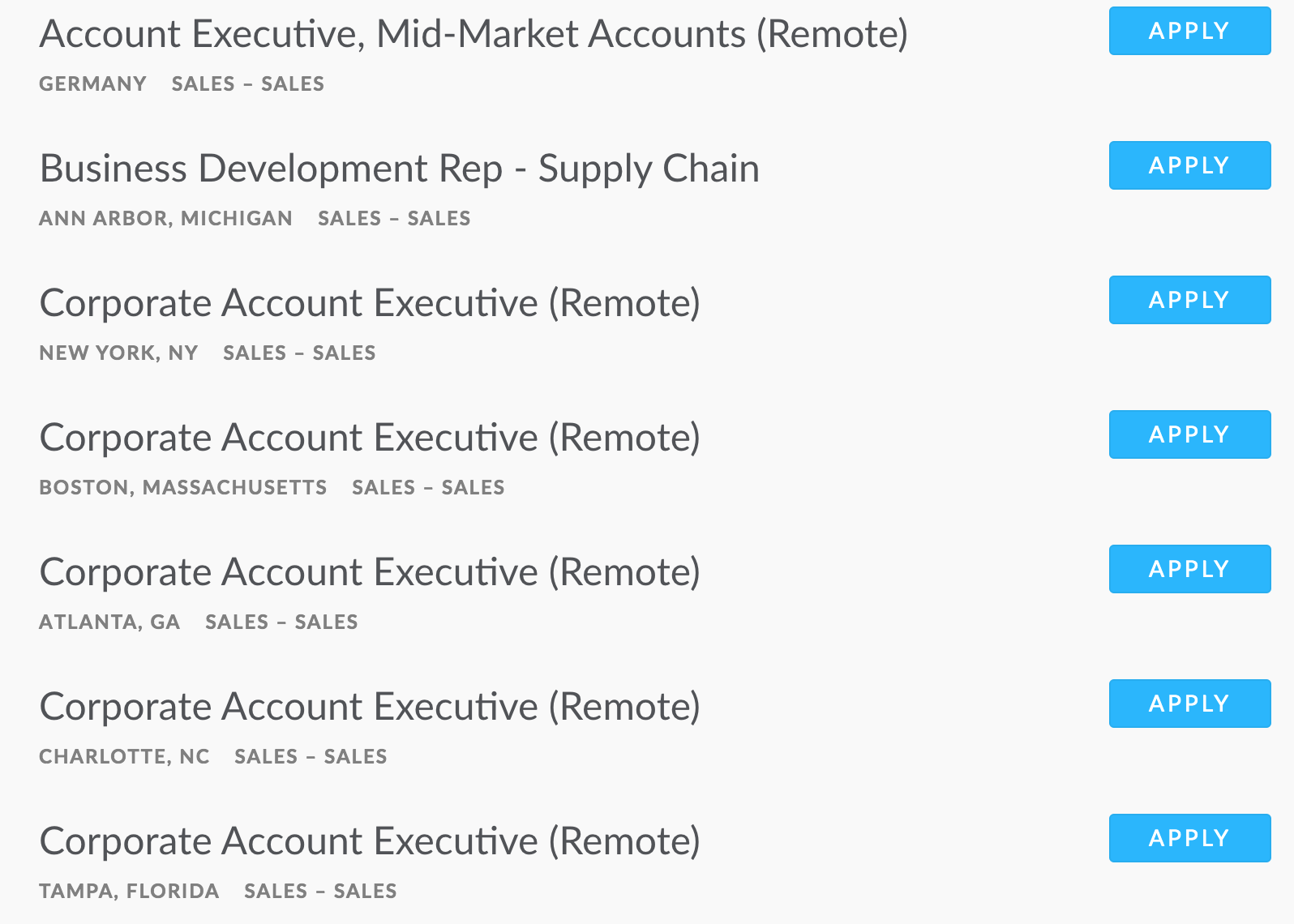Software sales jobs open doors to a dynamic and rewarding career in the tech industry, where professionals play a crucial role in driving innovation and growth. As we delve into the realm of software sales roles, a world of opportunities and challenges awaits those seeking success in this competitive field.
Introduction to Software Sales Jobs

Software sales jobs involve selling software products and services to businesses or individual customers. These professionals play a crucial role in the tech industry by promoting and persuading potential clients to invest in software solutions that can improve efficiency, productivity, and overall business performance.
The Importance of Software Sales Professionals
Software sales professionals are essential in bridging the gap between technology companies and their target market. They are responsible for understanding customer needs, demonstrating the value of the software, negotiating contracts, and ultimately closing deals. Their expertise is vital in driving revenue and fostering long-term relationships with clients.
Skills Required to Excel in Software Sales Roles
- Strong Communication Skills: Software sales professionals must effectively communicate the features and benefits of the product to potential customers.
- Technical Knowledge: Understanding the software’s functionality and how it can address specific business challenges is crucial for success in this role.
- Negotiation Skills: The ability to negotiate terms and close deals with clients is essential for software sales professionals.
- Customer Relationship Management: Building and maintaining relationships with clients to ensure customer satisfaction and retention is key in software sales.
- Adaptability: The tech industry is constantly evolving, so software sales professionals must be adaptable to new technologies and market trends.
Types of Software Sales Jobs
Software sales roles encompass a variety of positions that play crucial roles in driving revenue and growth for software companies. Let’s explore some of the key types of software sales jobs and their responsibilities.
1. Account Executive
Account Executives are responsible for managing relationships with existing clients, upselling and cross-selling products, and bringing in new business. They work closely with customers to understand their needs and ensure satisfaction.
2. Sales Engineer
Sales Engineers, also known as Solutions Engineers, are technical experts who work with sales teams to demonstrate how software products meet customer needs. They provide technical expertise during the sales process and help address any technical concerns.
3. Sales Development Representative
Sales Development Representatives focus on generating leads and qualifying prospects for the sales team. They engage with potential customers through various channels to create interest in the software product and set up meetings for the sales team.
4. Sales Manager
Sales Managers oversee and lead a team of sales professionals, setting targets, providing coaching and training, and ensuring the team meets revenue goals. They play a strategic role in driving sales performance and growth.
Career Progression Paths
- Entry-level positions such as Sales Development Representative can lead to roles as an Account Executive or Sales Engineer.
- Experienced Account Executives can progress to roles as Sales Managers, leading sales teams and developing strategic sales plans.
- Top-performing sales professionals may have opportunities for advancement to executive-level positions, such as VP of Sales or Chief Revenue Officer.
Essential Qualifications for Software Sales Jobs

To excel in software sales, certain qualifications are essential to demonstrate proficiency and credibility in the field. Whether it’s understanding complex technical concepts or effectively communicating the value of software solutions, having the right qualifications can significantly impact your success in software sales.
Technical Background in Software Sales
Having a technical background in software sales is highly advantageous as it allows you to better understand the products you are selling and effectively communicate their features and benefits to potential clients. Key qualifications that can strengthen your technical knowledge include:
- Previous experience in software development or programming
- Understanding of software architecture and design principles
- Familiarity with different programming languages and technologies
Certifications and Courses
Obtaining relevant certifications and completing specialized courses can enhance your prospects in software sales by demonstrating your commitment to continuous learning and development. Some examples of certifications and courses that can boost your credibility in software sales include:
- HubSpot Sales Software Certification
- Salesforce Certified Sales Professional
- LinkedIn Learning courses on software sales techniques
Strategies for Success in Software Sales
Effective strategies for prospecting and lead generation in software sales involve leveraging various techniques to identify and engage potential clients. Building strong relationships with clients is crucial in software sales to foster trust and loyalty. Additionally, mastering negotiation techniques specific to software sales can help close deals effectively.
Prospecting and Lead Generation
Effective prospecting and lead generation are essential for success in software sales. Here are some strategies to consider:
- Utilize social media platforms and online networks to identify potential leads.
- Attend industry events and conferences to network with key decision-makers.
- Utilize customer relationship management (CRM) tools to track and manage leads effectively.
- Personalize outreach efforts to demonstrate genuine interest in solving the client’s challenges.
Building Strong Relationships with Clients
Building strong relationships with clients is crucial in software sales to establish trust and credibility. Here are some tips to strengthen client relationships:
- Regularly communicate with clients to understand their evolving needs and challenges.
- Provide exceptional customer service to demonstrate commitment to client success.
- Offer personalized solutions tailored to each client’s specific requirements.
- Seek feedback from clients to continuously improve products and services.
Negotiation Techniques
Mastering negotiation techniques specific to software sales can help secure profitable deals. Here are some tips for successful negotiations:
- Understand the client’s pain points and position your product as the solution.
- Highlight the unique value proposition of your software to justify pricing and terms.
- Focus on building a mutually beneficial agreement rather than solely on winning the deal.
- Be prepared to walk away from negotiations if the terms are not favorable for both parties.
Challenges and Opportunities in Software Sales

In the dynamic world of software sales, professionals encounter a variety of challenges while also being presented with numerous opportunities for growth and success. Understanding these aspects is crucial for navigating the competitive landscape and achieving desired outcomes.
Common Challenges Faced by Software Sales Professionals, Software sales jobs
- Intense Competition: The software sales industry is highly competitive, with numerous companies vying for market share. Sales professionals often face challenges in standing out from the competition and differentiating their offerings.
- Complex Sales Cycles: Software sales typically involve long and complex sales cycles, requiring sales professionals to navigate multiple stakeholders and decision-making processes. This can prolong the sales process and pose challenges in closing deals.
- Technological Advancements: Rapid advancements in technology constantly reshape the software sales landscape. Sales professionals must stay updated with emerging technologies to remain relevant and effectively promote their solutions.
- Resistance to Change: Some potential clients may be resistant to adopting new software solutions due to concerns about implementation, training, or compatibility. Overcoming this resistance requires effective communication and tailored solutions.
Emerging Trends and Opportunities in Software Sales
- Shift to Subscription-Based Models: The industry is witnessing a shift towards subscription-based pricing models, offering ongoing revenue streams for software companies and increased flexibility for customers.
- Focus on Customer Experience: Companies are placing greater emphasis on delivering exceptional customer experiences to drive loyalty and retention. Sales professionals can capitalize on this trend by aligning their solutions with customer needs and preferences.
- Integration of AI and Automation: The integration of artificial intelligence and automation tools in software sales processes can enhance efficiency, improve targeting, and personalize interactions with customers.
- Global Market Expansion: The digital nature of software enables companies to expand their reach globally. Sales professionals can leverage this opportunity by tapping into new markets and diversifying their customer base.
Adapting to Changes in the Software Sales Landscape
- Continuous Learning: To thrive in software sales, professionals must commit to ongoing learning and skill development. This includes staying informed about industry trends, honing negotiation skills, and mastering sales techniques.
- Agile Approach: Sales professionals should adopt an agile mindset to quickly adapt to changing market dynamics and customer needs. Flexibility and responsiveness are key to navigating the evolving software sales landscape.
- Data-Driven Decision-Making: Leveraging data analytics and insights can provide valuable information for optimizing sales strategies, identifying trends, and making informed decisions to drive sales performance.
- Collaboration and Networking: Building strong relationships with colleagues, industry peers, and potential clients can open doors to new opportunities and foster collaborative partnerships that benefit both parties.
Ending Remarks: Software Sales Jobs
In conclusion, software sales jobs offer a unique blend of challenges and rewards, making it an exciting field for individuals with a passion for technology and sales. With the right skills and strategies, navigating the landscape of software sales can lead to a fulfilling and prosperous career journey.
